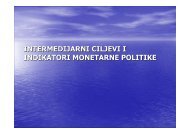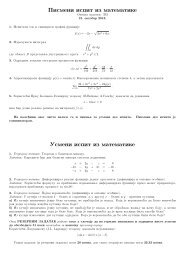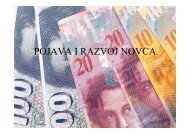WHITE BOOK 2004 EBU Tournament Directors' Guide Edited by ...
WHITE BOOK 2004 EBU Tournament Directors' Guide Edited by ...
WHITE BOOK 2004 EBU Tournament Directors' Guide Edited by ...
You also want an ePaper? Increase the reach of your titles
YUMPU automatically turns print PDFs into web optimized ePapers that Google loves.
White Book – November 2003 – Chapter IV<br />
Law 10<br />
Assessment of a penalty<br />
10.1 Evidence of how a player has been damaged <strong>by</strong> an infraction<br />
Usually a player will know how he or she has been damaged, will be able to tell the TD<br />
how this was, and will not need to be prompted <strong>by</strong> partner or 'led' <strong>by</strong> the TD. However,<br />
weaker or less experienced players may need to be carefully questioned <strong>by</strong> the TD to<br />
establish what their actions would have been: many such players need help to<br />
determine what their action would have been in hypothetical circumstances. Their<br />
partner's comments will rarely be helpful, and should be strongly discouraged until the<br />
TD has completed questioning the player.<br />
A special case is one in which a player's description of his partner's hand fails to match<br />
it. This is likely to lead to misinformation for the opponents and unauthorised<br />
information for partner. Players sometimes claim damage only for one or the other, but<br />
the TD should consider both. It is not unreasonable that a player will miss one or the<br />
other when claiming damage.<br />
Law 11<br />
Forfeiture of the right to penalise<br />
11.1 When to apply Law 11A<br />
In general the main use of this Law is to stop players taking advantage of the Laws in<br />
ways that are perceived as unfair. It is normal enough, for example, for a player to call<br />
the TD for a suspected revoke only at the end of a deal, or for the possibility of an<br />
opponent’s call or play being based on unauthorised information from his partner.<br />
However, there are some cases where the right to penalise might be forfeited, and we<br />
give a couple of examples:<br />
Examples<br />
(a) A defender exposes a card during the play. No TD is called, but the<br />
declarer tells the defenders it is a major penalty card. Later in the play, the<br />
partner of the player with a penalty card gets the lead, and the TD is called<br />
to enforce lead penalties. The offending players often had no idea that they<br />
could have worked to mitigate the penalty.<br />
The normal ruling in this case would be to apply Law 11A and to forfeit the<br />
right to penalise. Furthermore, the TD would designate the card as not<br />
being a penalty card per Law 50, and it would be returned to the player’s<br />
hand.<br />
(b) Suppose a player makes an insufficient bid, and then corrects it himself<br />
without the TD being called. The next player accepts this, which is not<br />
permitted (see #27.1)<br />
Note The next player may always accept the original insufficient bid.<br />
Play then proceeds. If it now happens that this leads to an advantageous<br />
position for the side which made the insufficient bid then an opponent might<br />
call the TD to try to get back what was lost. The TD would apply Law 11A<br />
and let the board continue.<br />
21





